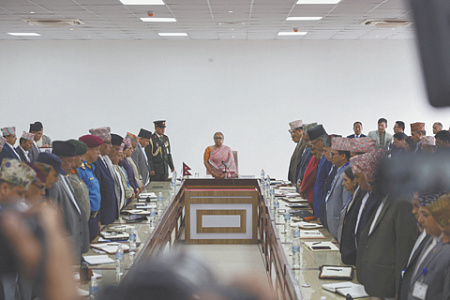
Nepal’s newly appointed interim government, led by former Chief Justice Sushila Karki, faces the monumental task of stabilizing a nation rocked by violent youth-led protests. While promising to hold parliamentary elections within six months, Karki has also vowed to bring to justice those responsible for a wave of arson and looting that targeted government buildings and the homes of officials, including her predecessor.
The unrest, as reported by The New York Times, began as peaceful demonstrations by young people protesting systemic corruption and a government ban on social media platforms. The situation dramatically escalated when security forces opened fire on demonstrators, killing several students. In retaliation, the protests morphed into a violent uprising, with participants using gasoline cans and weapons to attack state symbols and the properties of the political and business elite.
The ensuing chaos resulted in thousands of burned buildings, including ministries and the residences of politicians, and has claimed over 50 lives, the majority of them protesters. A growing sense of regret is now palpable among the very youth who initiated the movement. Many students, identifying as “Generation Z,” have disavowed the violence, recognizing the protest had spiraled out of control. “You’ve burned down our country,” pleaded Bikram Thapa, a popular blogger and burn survivor, in a message to demonstrators. “Now do something to help it get back on its feet.”
This shift in perspective is echoed outside the capital. Birendra Kumar, a shop owner from southern Nepal, initially joined the protests, angered by bribery and the siphoning of public funds. Now recovering from burns sustained while trying to save his family’s shop from arsonists, his view has changed. “I supported the protests hoping they would change the country,” Kumar said. “But I have changed instead. I realized that anarchy is dangerous.”
According to the Associated Press, a degree of calm has returned following the appointment of Karki, a respected figure from her time on the Supreme Court. President Ram Chandra Paudel announced her as head of the interim government while simultaneously dissolving parliament, which had served only half of its term since the 2022 elections, and scheduling a new vote. The move has been criticized by some legal experts as a constitutional violation. Karki took power after her predecessor, Sharma Oli, was forced to flee his official residence as it was set ablaze, an incident that left his wife severely burned.
In one of her first acts as prime minister, Karki visited a hospital to meet with injured demonstrators, promising to focus on rebuilding the country and healing its societal wounds. Her leadership now walks a fine line between pacifying a disillusioned youth and reassuring an establishment demanding order. The crisis in Nepal reflects a troubling pattern in South Asia, where similar youth-led movements against corruption in countries like Bangladesh and Sri Lanka have also descended into widespread, destructive violence.
